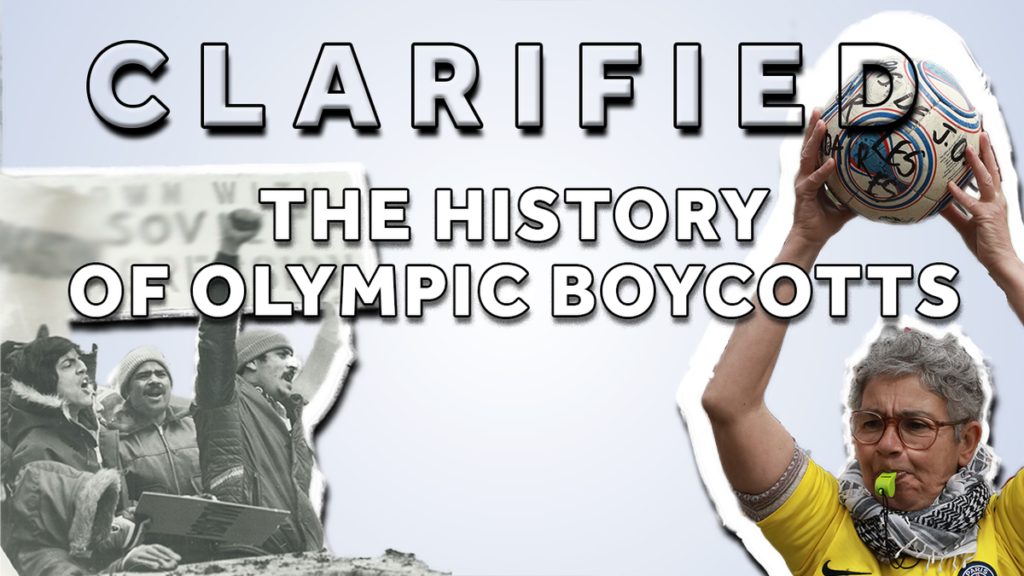In April, pro-Palestinian protesters gathered in front of the Paris Olympics headquarters, calling on officials to restrict Israel's participation in response to the ongoing conflict in Gaza. The International Olympic Committee has also banned the Russian Olympic Committee from participating in the 2023 Games in response to the invasion of Ukraine the previous year. Athletes from Russia and ally Belarus are still allowed to participate, but only as individual athletes. Protests, bans and boycotts at the Olympics are nothing new. And the Paris 2024 Games will be no exception. Melbourne 1956 Boycott The first Olympic boycott in history occurred in Melbourne, Australia in 1956. It was the first time Australia had hosted the games. There were countless countries that refused to participate for various reasons. The Netherlands, Spain and Switzerland boycotted the games due to the Soviet invasion of Hungary just a few weeks earlier. Hungary competed in the games. A water polo match between Hungary and the Soviet Union turned violent, with Hungary ultimately winning and taking home the gold medal. Egypt, Iraq, and Lebanon also boycotted the games in response to the Suez Canal Crisis (when British, Israeli, and French troops invaded Egypt to seize control of the waterway). The People's Republic of China did not participate in the Olympics because Taiwan was allowed to participate as a separate country. China did not compete until the 1980 Winter Olympics. 1976 Montreal Boycott In 1976, 28 African countries boycotted the Montreal Summer Games. These countries refused to allow their national rugby team to compete, along with New Zealand, which defied the international sports embargo against South Africa. South Africa was banned from the 1964 Olympics because of the racial discrimination policy known as apartheid. It was not until 1992 that they competed in the Olympics. 1980 Moscow Boycott The largest boycott in Olympic history occurred at the 1980 Moscow Games. Led by the United States, over 60 countries joined the boycott. This was in retaliation against the host country, the Soviet Union, which had invaded Afghanistan a year before the Games. 1984 Los Angeles Boycott The following year, in 1984, when the United States hosted the Olympics, the Soviet Union retaliated with a boycott along with 14 allies, including East Germany. 1968 Mexico City Boycott The most symbolic protest occurred at the 1968 Summer Olympics in Mexico City. African-American athletes Tommie Smith and John Carlos, who won gold and bronze medals in the 200 meters, raised their fists as the U.S. national anthem was played during the awards ceremony. Although the fundamental purpose of the Olympics is to unite nations through a shared love of athletic competition, the Olympics are also, and will continue to be, a means of raising awareness of important political issues.
In April, pro-Palestinian protesters gathered outside the Paris Olympics headquarters, calling on authorities to limit Israeli participation in response to the ongoing conflict in Gaza.
The International Olympic Committee also banned the Russian Olympic Committee from taking part in the 2023 Olympics following the country's invasion of Ukraine the previous year.
Athletes from Russia and its ally Belarus will be allowed to participate as individual competitors only.
Protests, bans and boycotts at the Olympics are nothing new, and Paris 2024 will be no exception.
Boycott of the 1956 Melbourne Olympics
The first ever Olympic boycott took place in Melbourne, Australia in 1956, the first time Australia hosted the games.
Several countries refused to participate for various reasons.
The Netherlands, Spain and Switzerland boycotted the tournament following the Soviet invasion of Hungary just a few weeks earlier.
Hungary also participated in the tournament, and the water polo match between Hungary and the Soviet Union was fierce, with Hungary ultimately emerging victorious and taking home the gold medal.
Egypt, Iraq and Lebanon also boycotted the Olympics in response to the Suez Canal Crisis, in which British, Israeli and French troops invaded Egypt to gain control of the waterway.
The People's Republic of China did not participate in the Olympics because Taiwan was allowed to participate as a separate country. China did not compete in the Olympics until the 1980 Winter Olympics.
Boycott of the 1976 Montreal Olympics
In 1976, 28 African countries boycotted the Montreal Summer Olympics because they refused to compete with the New Zealand national rugby team, which had ignored the international sports embargo against South Africa.
South Africa was kicked out of the Olympics in 1964 due to its racial segregation policy known as apartheid. The country only returned to the Olympics in 1992.
Boycott of the 1980 Moscow Olympics
The largest boycott in Olympic history took place at the 1980 Moscow Olympics.
More than 60 countries, led by the United States, joined the boycott in response to the host country, the Soviet Union, invading Afghanistan a year before the games.
Boycott of the 1984 Los Angeles Olympics
When the United States hosted the Olympics in 1984, the Soviet Union retaliated with a boycott, along with 14 of its allies, including East Germany.
Boycott of the 1968 Mexico City Games
The most iconic protests occurred at the 1968 Summer Olympics in Mexico City.
African-American athletes Tommie Smith and John Carlos, who won gold and bronze medals in the 200 meters, raised their fists as the U.S. national anthem was played at the awards ceremony.
The two players protested to raise awareness of the Black Power movement in the United States.
While the Olympics' fundamental purpose is to bring nations together through a shared love of sporting competition, the Games are also, and will continue to be, a means of raising awareness of important political issues.

